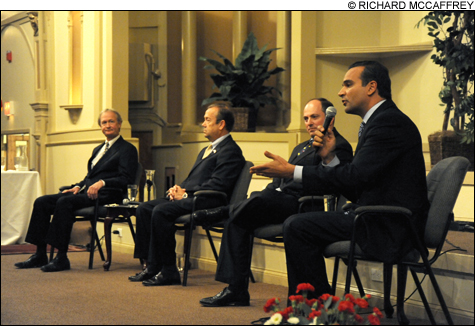
TALKING HEADS The “Trust Chafee” message comes with an unspoken corollary — “you can’t trust the other guy.” |
In a year that finds most top-tier politicians promising jobs, jobs, and more jobs, independent gubernatorial candidate Lincoln Chafee is betting his political future on a different message: trust me.
The campaign has planted thousands of “Trust Chafee” signs in Rhode Island lawns. The bumper stickers — white text stamped on blue-and-green ovals — are de rigueur in Warwick and on the East Side of Providence.
The logo sits atop the chafeeforgovernor web site and appears, with a flash, at the end of campaign commercials.
There’s a certain logic to the appeal. The family name gleams with an upright, Yankee patina that dates back to the earliest days of Rhode Island. And the candidate’s father John Chafee, a well-regarded governor and senator, ran as “the man you can trust.”
Chafee’s own tenure as a Senate Republican was marked by high-profile opposition to the Bush Administration on the Iraq War and tax cuts. And after he lost his re-election bid in 2006, he quit the GOP and endorsed Barack Obama for president, cementing a reputation for principled independence.
“Chafee,” says Providence College political scientist Tony Affigne, “may be one of the few politicians in the country, and certainly the only one in Rhode Island, who can put up ‘Trust Me’ lawn signs credibly.”
But with voters so intently focused on the economy, one big question hangs over the campaign: is trust enough?
‘TAX US TO DEATH’
It’s a Tuesday afternoon and the candidate, his collar a bit askew, is making the rounds at the East Providence Senior Center: a stop at the card table, a brief tour of the workout room, and off to the cafeteria.
Chafee, who served as Warwick mayor before moving to the Senate, has never been particularly skilled in retail politics. He is soft-spoken. Sweet, but a bit awkward. Some of the seniors seem eager to engage, but he can manage just a few wooden lines in response — “I’m working hard” or “moving Rhode Island forward.”
Whatever his shortcomings as campaigner, though, it is clear that Chafee can draw on a remarkable reservoir of good will: “God bless you,” says one man, “we need an honest politician.”
“You remind me of your father,” adds another senior, approvingly.
Chafee’s popularity has never really flagged. When Democrat Sheldon Whitehouse booted him from the Senate four years ago, the challenger harnessed a national wave of anti-Republican feeling, not any real distaste for Chafee himself.
And since then, Chafee has dropped what former Brown University political scientist Jennifer Lawless calls the one thing voters didn’t trust about him: the “R” after his name.
Indeed, there seems a sort of collective guilt in the state over Chafee’s Senate ouster that could redound to his benefit on November 2. But the candidate is hardly without critics. And if he needs any reminder, he gets it this afternoon: “You’re the guy,” says one man, seated in the cafeteria, “who wants to tax us to death.”
The indelicate charge refers to Chafee’s signature campaign proposal: imposing a one percent sales tax on currently exempt items — food, clothing, and medicine among them.